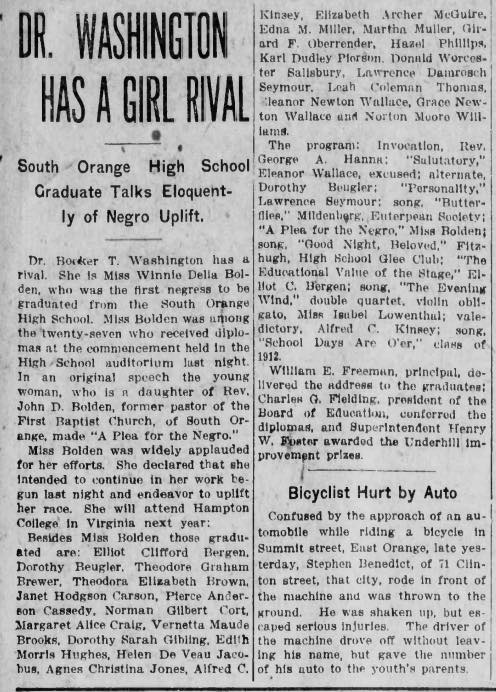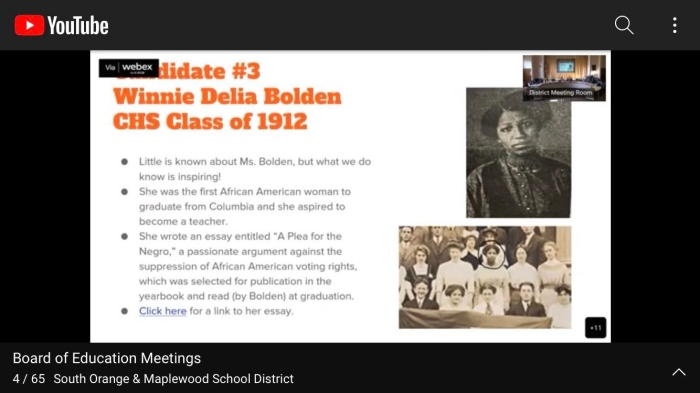Renaming Jefferson school.
Here's another article from TAP - the first one I posted had a BOE member pointing out that 14 students were involved - whereas this one shows the process to be a bit different:
Siders said: “The Jefferson student population put a lot of work into this, and I feel that we, as a board, owe it to them to make this decision relatively quickly,”
Bergen said: “I support the board making a decision as soon as possible based on the fabulous recommendations and process that we had at the Jefferson School community as we've been asked to do by several members of the Jefferson PTA and the President's Council”.
So - was it a few students or the whole student population, and some PTA and President's council.
Also, I'm just curious - what year did Winnie graduate?
jamie said:
Here's another article from TAP - the first one I posted had a BOE member pointing out that 14 students were involved - whereas this one shows the process to be a bit different:
Also, I'm just curious - what year did Winnie graduate?
1912
jamie said:
Also, I'm just curious - what year did Winnie graduate?
The Village Green says that it was 1912, and that she was known as Delia, not Winnie, so it’ll be Delia Bolden Elementary.
https://www.facebook.com/villagegreennj/posts/3095082954086642
nohero said:
Yes, I know that. I was just pointing out that the original intent of naming the school was probably not "Let's honor Thomas Jefferson", as opposed to naming it after the place it was located.
I was posting it so we wouldn’t end up talking about the Jefferson’s who moved up to the east side of Manhattan…
The village was named after Thomas Jefferson, and to keep it simple I suppose they named the school after that name…
I’m still fascinated that union was once called Connecticut Farms…
As long as we are reviling President Jefferson, how about renaming Jefferson Avenue. How about renaming Washington Park. How about Lincoln PLace. How about Roosevelt Road? I don't like President Garfield, how about Garfield Place?
Don't we have more pressing issues to occupy our minds?
tjohn said:
Historical cleansing seems a tricky thing to me. So many people who have helped to build great things also have significant flaws. Would it not be better to look at a person and say what are the great things they accomplished in their lives and honor them accordingly? The Founding Fathers, whatever the flaws, built a nation that has stood the test of time pretty well. On the other hand, if I look at Confederate generals, you see that the greatest accomplishments in their lives was leading a fight to preserve a slave-owning white supremacist society. So, I don't have a problem with naming things after the Founding Fathers or Union generals, perhaps. But honoring Confederate generals is in a different category.
And sometimes, the full telling of a persons story is interesting. Nathaniel Bedford Forrest, towards the end of his life, renounced the activities of the KKK and oppression of Blacks. Perhaps too little, too late, but the change of heart is a story worth telling.
But does a name on a building convey all that nuance. Isn't that for books and classroom discussions?
mrmaplewood said:
As long as we are reviling President Jefferson, how about renaming Jefferson Avenue. How about renaming Washington Park. How about Lincoln PLace. How about Roosevelt Road? I don't like President Garfield, how about Garfield Place?
Don't we have more pressing issues to occupy our minds?
When it was described as Jefferson's name on a building where many many Black children enter every day to learn, I thought differently about it. If I'm a 10 year-old Black student, how would I feel entering a school named after a man who owned people who looked like me?
mrmaplewood said:
As long as we are reviling President Jefferson, how about renaming Jefferson Avenue. How about renaming Washington Park. How about Lincoln PLace. How about Roosevelt Road? I don't like President Garfield, how about Garfield Place?
Don't we have more pressing issues to occupy our minds?
You’re free to make your case for renaming any of those and take it as far as you can go.
DaveSchmidt said:
mrmaplewood said:
As long as we are reviling President Jefferson, how about renaming Jefferson Avenue. How about renaming Washington Park. How about Lincoln PLace. How about Roosevelt Road? I don't like President Garfield, how about Garfield Place?
Don't we have more pressing issues to occupy our minds?
You’re free to make your case for renaming any of those and take it as far you can go.
if anyone wants to change the name of Washington Park to Max Weinberg Park, I'm in.
Jaytee said:
nohero said:
Yes, I know that. I was just pointing out that the original intent of naming the school was probably not "Let's honor Thomas Jefferson", as opposed to naming it after the place it was located.
I was posting it so we wouldn’t end up talking about the Jefferson’s who moved up to the east side of Manhattan…
The village was named after Thomas Jefferson, and to keep it simple I suppose they named the school after that name…
I’m still fascinated that union was once called Connecticut Farms…
A group of dissidents led by Robert Treat left the Connecticut Colony and settled in NJ, founding Newark in 1666. So that would explain that.
How would you feel if you were a Black student or parent, and your child's school was named after a slaveholder, who secretly had an affair and a child with one of his initially underage slaves, which he always denied, in addition to writing about Black people being as inferior to white? I personally would find it disrespectful and insulting, and would prefer a name change, particularly one that was local, and inspirational in addressing equality concerns. It could serve as a useful historical wake-up call to consider history in a broader context than we were taught it back in the day, when I was a SOMA student and never heard about Jefferson's slaves, only the Declaration.
If it's renamed, the new name has to have three syllables so that changing the school song is easy...
jamie said:
Here's another article from TAP - the first one I posted had a BOE member pointing out that 14 students were involved - whereas this one shows the process to be a bit different:
Siders said: “The Jefferson student population put a lot of work into this, and I feel that we, as a board, owe it to them to make this decision relatively quickly,”
Bergen said: “I support the board making a decision as soon as possible based on the fabulous recommendations and process that we had at the Jefferson School community as we've been asked to do by several members of the Jefferson PTA and the President's Council”.
So - was it a few students or the whole student population, and some PTA and President's council.
Also, I'm just curious - what year did Winnie graduate?
The description of the renaming process is confusing because I believe Delia Bolden was the third choice (out of five plus one non-person school name) presented by the students. As two others were higher on their list but not selected by the BOE, it's not accurate to say the students made the choice. That's why the announcement email speaks in terms of the student choosing "attributes" that would be appropriate for the new school namesake.
That being said, I like the Delia Bolden selection. Her essay is a wonderful starting point for students to learn about the history of their community and their country.
The PTA has already updated their FB page:
I note that Alfred Kinsey, perhaps our most famous graduate ever, who later wrote The Kinsey Report, the first monumental empirical study of sexuality as actually practiced, graduated with Delia Bolden. Something should be named after him sometime too, perhaps the high school  .
.
Oh yeah. Christopher Columbus. He was responsible for killing lots of indigenous peoples. For the sakes of all indigenous people everywhere, we should rename Columbia High School.
I repeat: Don't we have more pressing issues to occupy our minds?
Why is it that you think we can't do two things at once? We launched our new fire department today as well.
I would love to read Delia Bolden's essay. The library yearbooks start at 1915,not as low as 1912.
galileo said:
I would love to read Delia Bolden's essay. The library yearbooks start at 1915,not as low as 1912.
https://www.mattersmagazine.com/post/a-voice-from-the-archives
From the Essay:
You say that if the negro was given his right position he would immediately strive for social equality that would lead to intermarriage. The negro does not wish for this any more than the white race.
Tell that to Clarence Thomas.
I was just wondering about other schools in our District
Marshall owned hundreds of slaves throughout his lifetime. He traded in slaves and in the 1830s auctioned off some of them to pay off his son's debts. And yet the Virginian slave lord heard roughly 50 cases involving slavery during his 34-year tenure as chief justice.
I am not 100% sure as to who either Marshall or Clinton were named after. But here is a little bit on the Clinton family:
DeWitt Clinton’s name graces a popular 5.8-acre park, a NYCHA development and a high school. All despite the fact that the former New York City mayor and New York State governor, who masterminded the Erie Canal waterway linking the Hudson River to the Great Lakes, owned slaves. In fact, he came from a family of slave owners — including his uncle, long-serving governor George Clinton — who are the namesakes for Brooklyn’s Clinton Hill neighborhood.
For his part, George — a founding member of the Manumission Society, which promoted abolition — owned as many as eight slaves, according to the 1790 census. DeWitt’s upstate-based father, James Clinton, owned up to 13, according to those same census records.

“Anyone in New York State in particular who owned more than 10 individuals is … in a league all their own,” said Brooklyn Historical Society historian Nalleli Guillen. “Holding enslaved people became a marker of affluence and prestige.” DeWitt, as far as records show, owned at least two slaves while living in New York City: a woman named Massa, whom he freed in 1810, and another named Jenny.
Despite George’s position with the Manumission Society, he wasn’t as active an advocate for abolition as figures like John Jay, said Guillen. DeWitt, meanwhile, signed deeds freeing slaves during his years as mayor and supported public education, an avenue that allowed free black children to attend school. By the time of his death in 1858, he owned no slaves. “They both … existed within this sphere, but it doesn’t sound like they were particularly vocal on [abolition],” said Guillen. “It doesn’t seem like they did a whole lot of heavy lifting.”
tpb said:
https://www.mattersmagazine.com/post/a-voice-from-the-archives
I read the entire essay, could have been written last week, because it shows not much has changed. One hundred years…
I would like to suggest a "modest proposal" for Marshall School, namely that it be renamed in honor of Justice Thurgood Marshall, first Black Supreme Court Justice, civil rights activist, and attorney who successfully argued the Brown vs. Board of Education case that abolished the separate-but-equal legal segregation. That way Marshall Elementary School and the district would be honoring a great civil rights leader who fought for educational justice, while at the same time not having to spend thousands of dollars in creating new stationery and new school signs while stressing out former graduates who would have to learn a new name for their alma mater.
STANV said:
I was just wondering about other schools in our District
Marshall owned hundreds of slaves throughout his lifetime. He traded in slaves and in the 1830s auctioned off some of them to pay off his son's debts. And yet the Virginian slave lord heard roughly 50 cases involving slavery during his 34-year tenure as chief justice.
Act Prohibiting Importation of Slaves of 1807
BarneyGumble said:
Act Prohibiting Importation of Slaves of 1807
Thomas Jefferson did that.
The problem with Jefferson as opposed to other slave owners is his pure hypocrisy. Yes, he wrote that. What it actually did was make his slaves, whom he never freed, more valuable in a closed market. In fact, slavery was becoming less profitable in the upper south at this point, and much more profitable in the lower south. This act incentivised Virginia slave owners to break up families and sell them south.
Guess he shouldve flooded the market with more slaves. Or maybe tweeted asking the Slave companies to lower their prices. may have helped his 1808 prospects.
BarneyGumble said:
Guess he shouldve flooded the market with more slaves. Or maybe tweeted asking the Slave companies to lower their prices. may have helped his 1808 prospects.
a nothing answer to a factual response. His descendants did fill the market with his slaves, very profitably.
you could make the argument that Jefferson was an enlightened man of his times if he had freed his slaves early in his life. He never did.
BarneyGumble said:
Act Prohibiting Importation of Slaves of 1807
Thomas Jefferson did that.
Human beings were the biggest capital investment of white property owners in the South. Banning the importation of slaves increased the value of their own holdings, not to mention the value of the increase in number of human beings born to the humans they claimed ownership of.
That was a classic example of protectionism, except with humans instead of wheat or steel.
For Sale
Free Items
Rentals
-
Huge Brand New construction Apartment in 2 family home with 4 bedrooms 3 bathrooms
4 Bd | 3Full Ba
$4,500


























Let me preface my comment by saying that I almost always agree with your posts. That said, I don't see how one can separate honoring the place without honoring the person for which the place was named.
The school should have been renamed for Amalya Kearse.